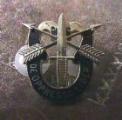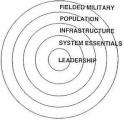On your question #1, what is the magnitude of negative sentiment against the Taliban among Pukhtuns?
A healthy percentage (your should have data on this among the various contributors to SWJ, as you guys are sharp on detailed information and data) of the Pakistani Frontier Corp; the regular Pak military in general (Army, Navy, and Air Force) are ethnic Pukhtuns. But, under current circumstances the "loyalty" of these in uniform Paksitanis who are simultaneously Pukhtuns is questioned by some, of whom I am one.
As to how these existing Pak military folk who are ethnic Pukhtuns view this, we would slide into the awful discussion of the Pak general officership and leadership in general having used through the ISI the Taliban as surrogates to cause trouble both with Afghanistan and with India, primarily over Kashmir. Very messy topic.
As to the younger Pukhtuns, hundreds of whom belong to and write on Global Hujra Online, a minority want to work with today's Pak military in the hope that the Pak Government will actually use it's Army (more so than the Frontier Corp, which is or was designed to go along to get along with the wild frontier people...Pukhtuns of the most feudal background and levels of undersanding and lifestyle...).
Some (but not all) of the most outspoken young Pukhtuns on Global Hujra Online are high school and lower level university students abroad, mainly in Europe. Many such, but not all, were born in Europe of native Pukhtun parents. These heavily outspoken younger Pukhtuns, apart from my side e-mail I plan to send you shortly [privately] are [my opinion] disorganized day dreamers who dote on who conquered who hundreds of years ago down to the fight with the USSR in the 1980s. *As an Australian Army Captain currently in the field in Afghanistan recently noted some young observer Pukthun teenage boys recently joined Taliban Pukhtuns in a fire right against NATO forces in Afghanistan "on a lark" as it looked like a "fun" thing to do. This sort of spontaneous terrorism is a topic unto itself, but deserrves mentioning.
A third grouping of Pukhtuns who are daily on Global Hujra Online are the Taliban Pukhtuns themselves! They are learning the art of disinformation and confusion and move more and more adroitly between topics to create information chaos, simply put. They will also, of course, spread lies to alledge atrocities against the Pak miliary, the UN/NATO/US forces in the field over there. Of course don't expect these Taliban writers on Global Hujra Online to identify themselves as such. In general I have found some such are among those who are least able to write in English and thus tend to do postings in Pushtu instead of English. But, a few do try English and you can get "some" meaning out of their remarks.
My answer to your second, #2 question, is now in a private e-mail to you, as I believe it is best answered outside of public view at this time.
Stopping this open dialogue now, being "nice" for a change and not commenting at all in/on Bob's area of your counter questioning.










 ) ideology on many societies where it was totally inappropriate to do so. Indeed, I am forced to ask why you consider US ideology and governance as "superior"? Superior for whom in what conditions?
) ideology on many societies where it was totally inappropriate to do so. Indeed, I am forced to ask why you consider US ideology and governance as "superior"? Superior for whom in what conditions?

 ) and that was in reaction more to domestic political sentiment than anything else -- other than British urging which was quite strong. So you can place the blame for all that on Harry. The 54 accords occurred during Eisenhower's watch and John Foster Dulles was even more into containment than was Truman and a strong effort was made to get South Viet Nam into SEATO. It failed -- in any event, a part of the cost for those accords was a Mutual Defense Treaty.
) and that was in reaction more to domestic political sentiment than anything else -- other than British urging which was quite strong. So you can place the blame for all that on Harry. The 54 accords occurred during Eisenhower's watch and John Foster Dulles was even more into containment than was Truman and a strong effort was made to get South Viet Nam into SEATO. It failed -- in any event, a part of the cost for those accords was a Mutual Defense Treaty. 

Bookmarks